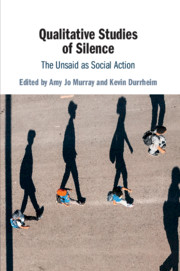Book contents
- Qualitative Studies of Silence
- Qualitative Studies of Silence
- Copyright page
- Dedication
- Contents
- Figures
- Contributors
- Acknowledgments
- Introduction: A Turn to Silence
- 1 Literal and Metaphorical Silences in Rhetoric: Examples from the Celebration of the 1974 Revolution in the Portuguese Parliament
- 2 Seeing Silenced Agendas in Medical Interaction: A Conversation Analytic Case Study
- 3 Listening to the Sound of Silence: Methodological Reflections on Studying the Unsaid
- 4 Social Silences: Conducting Ethnographic Research on Racism in the Americas
- 5 Intimate Silences and Inequality: Noticing the Unsaid through Triangulation
- 6 Silence in the Court: Moral Exclusion at the Intersection of Disability, Race, Sexuality, and Methodology
- 7 Silencing Self and Other through Autobiographical Narratives
- 8 Gendering the Unsaid and the Unsayable
- 9 The Language Ideology of Silence and Silencing in Public Discourse
- 10 Propaganda by Omission: The Case of Topical Silence
- 11 Silencing Whistleblowers
- 12 Between Sound and Silence: The Inaudible and the Unsayable in the History of the First World War
- 13 Affect and the Unsaid: Silences, Impasses, and Testimonies to Trauma
- 14 The Unsaid and the Unheard
- 15 Conclusion: Topographies of the Said and Unsaid
- Index
- References
10 - Propaganda by Omission: The Case of Topical Silence
Published online by Cambridge University Press: 30 June 2019
- Qualitative Studies of Silence
- Qualitative Studies of Silence
- Copyright page
- Dedication
- Contents
- Figures
- Contributors
- Acknowledgments
- Introduction: A Turn to Silence
- 1 Literal and Metaphorical Silences in Rhetoric: Examples from the Celebration of the 1974 Revolution in the Portuguese Parliament
- 2 Seeing Silenced Agendas in Medical Interaction: A Conversation Analytic Case Study
- 3 Listening to the Sound of Silence: Methodological Reflections on Studying the Unsaid
- 4 Social Silences: Conducting Ethnographic Research on Racism in the Americas
- 5 Intimate Silences and Inequality: Noticing the Unsaid through Triangulation
- 6 Silence in the Court: Moral Exclusion at the Intersection of Disability, Race, Sexuality, and Methodology
- 7 Silencing Self and Other through Autobiographical Narratives
- 8 Gendering the Unsaid and the Unsayable
- 9 The Language Ideology of Silence and Silencing in Public Discourse
- 10 Propaganda by Omission: The Case of Topical Silence
- 11 Silencing Whistleblowers
- 12 Between Sound and Silence: The Inaudible and the Unsayable in the History of the First World War
- 13 Affect and the Unsaid: Silences, Impasses, and Testimonies to Trauma
- 14 The Unsaid and the Unheard
- 15 Conclusion: Topographies of the Said and Unsaid
- Index
- References
Summary
Although propaganda is typically thought of as something created through tangible words or images, it can also occur via the absence of such stimuli. This chapter illustrates how such “propaganda-by-omission” can be created. The particular focus is on “topical silences,” those cases where failure to include information relevant to a certain topic can skew the recipient’s understanding of that topic in a propagandistic way. Such selectivity constitutes a type of “framing” driven by ideology including sociopolitical myths. Using as a case study the current diplomatic tension between the United States and North Korea, the chapter lays out a step-by-step procedure for analyzing such propagandistic silences. The discussion includes important caveats about “truth” and authorial intent and ends with practical advice for researchers and citizen activists.
Keywords
- Type
- Chapter
- Information
- Qualitative Studies of SilenceThe Unsaid as Social Action, pp. 186 - 205Publisher: Cambridge University PressPrint publication year: 2019
References
- 1
- Cited by

